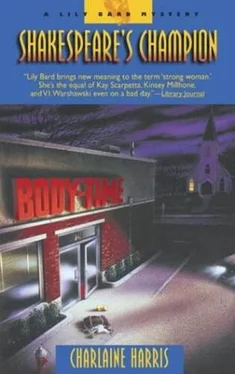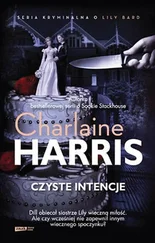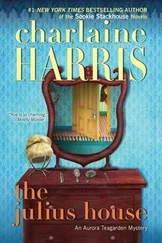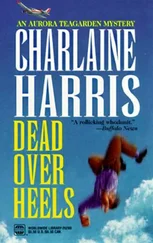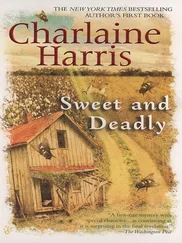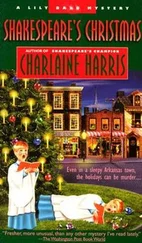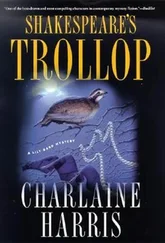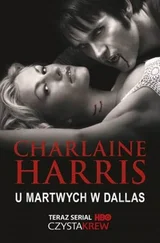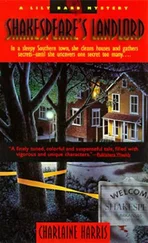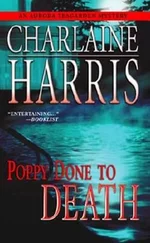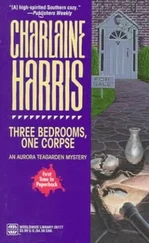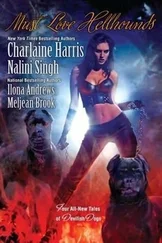“She’ll never last in Shakespeare,” I told the disappointed woman. I was surprised to hear my own voice.
“Thanks, Lily,” Janet said, sounding equally surprised. “We’ll have to wait and see.” To my amazement, she gave me a half-hug before unlocking her Trooper.
When I came in through the kitchen door, I could hear my television. Claude was parked in the double recliner watching a football game. He looked unnervingly at home. He waved a casual hand when I called “Hello,” so I didn’t hurry as I showered and dressed. When I emerged, once again made up and polished, Claude was in the kitchen drinking a glass of iced tea.
“What do you think of your new landlady?” I asked.
“The Whitley woman? Looks like a raccoon, don’t she, with all that eye makeup?” he said lazily.
I smiled. “Ready to eat?” I asked.
Soon we were driving toward Montrose, the nearest large town. It lay west and slightly north of Shakespeare, and it was the retail hub for many small towns like Shakespeare. Montrose, which boasted a population of around forty thousand year-round, more during college sessions, was where Shakespeareans went when they didn’t want to make the somewhat longer northeast drive to Little Rock.
I’d never been enthusiastic about Montrose, a town which could have been dropped anywhere in the United States without its visitors knowing the difference. Montrose had no character; it had shopping. There were all the usual fast-food places and all the usual chain stores, and a five-screen movie-plex, and a Wal-Mart Super Center. In my view, the main attractions of Montrose were its superior library, its one good independent bookstore, and perhaps four fairly good non-chain restaurants. And a couple of decent chain ones.
In the months I’d been seeing Marshall, I’d spent more time in Montrose than I had in the four years I’d lived in Shakespeare. Evenings at home had little charm for Marshall.
We’d tried every restaurant, sat through Jackie Chan and Steven Seagal movies, visited every sporting goods store to compare their prices to Winthrops‘, and done our weekly shopping at the Super Center.
This evening, Claude suggested a movie. I almost agreed out of courtesy. But remembering the uncomfortable hours with Marshall, I admitted, “I really don’t like going to the movies.”
“That so?”
“I don’t like sitting with a lot of strangers in the dark, having to listen to them shift around and rattle paper and talk. I’d rather wait until it comes out on video and see it at home.”
“Okay,” he said. “What would you like to do?”
“I want to eat at El Paso Grande and go to the bookstore,” I said.
Silence. I looked over at him out of the corners of my eyes.
“What about Catch the Wave and the bookstore?” he countered.
“Done,” I said, relieved. “You don’t like Tex-Mex?”
“Ate there last week when I had to come to Montrose to the courthouse.”
As we waited on our order in the seafood restaurant, Claude said, “I think Darnell Glass’s mother is going to bring a civil suit against the Shakespeare Police Department.”
“Against the department?” I asked sharply. “That’s unfair. It should be against Tom David.” Tom David Meicklejohn, one of Claude’s patrolmen, had long been on my black list, and after the Darnell Glass incident, he’d moved to the number-one spot.
Suddenly, I wondered if this was the real reason for the flowers, the evening out: this conversation.
“Her lawyer’s also naming Todd Picard. You think you could remember the timing just once more?”
I nodded, but I heaved an internal sigh. I was reluctant to recall the warm black night of The Fight. I’d been interviewed and interviewed about The Fight: That’s what all the Shakespeareans called it. It had taken place in the parking lot of Burger Tycoon, a locally owned hamburger place that competed valiantly with Burger King and McDonald’s, which were both down Main Street a piece.
I’d only come in on the crisis, but I’d read and heard enough later to flesh out what I’d actually seen.
Darnell Glass was sitting in his car in the Burger Tycoon parking lot, talking to his girlfriend. Bob Hodding, trying to pull into the adjacent parking space, hit Glass’s rear bumper. Hodding was white, sixteen years old, a student at Shakespeare High School. Glass was eighteen and in his freshman year at UA Montrose. He had just made the first down payment on his first car. Not too surprisingly, when he heard the unmistakable grinding crunch of the two bumpers tangling, Glass was enraged. He jumped out of his car, waving his hands and shouting.
Hodding was instantly on the offensive, since he knew the reputation of the young man whose car he’d just hit. Darnell Glass had attended the Shakespeare schools until he enrolled in college, and had a reputation as a bright and promising young man. But he was also known to be aggressive and hair-trigger sensitive in his dealings with white peers.
Bob Hodding had been raised with a Confederate flag flying in front of his house. He remembered Glass overreacting to situations at the high school. He wasn’t afraid, since he had three of his buddies in his car, and he wasn’t about to apologize in front of them, or admit his driving had been less than adequate.
A couple of witnesses told Claude later, privately, that Hodding pushed every emotional button he possibly could to further enrage Darnell Glass, including a jibe about Glass’s mother, a junior high school teacher and well-known activist.
It was no surprise to anyone when Glass went ballistic.
And that was where I came in. I hadn’t ever met Darnell Glass or Bob Hodding, but I was there when The Fight began.
So were two policemen.
I’d just pulled into the parking space on the other side of Glass’s, having picked that night of all nights to buy a hamburger instead of cooking for myself, an event so rare it later seemed to me that a cosmic joke had placed me at the punch line. It was a very warm evening in early September; of course, in Shakespeare we have to mow our yards until well into November.
I was wearing my usual T-shirt and baggy jeans, and I’d just finished work. I was tired. I just wanted to get my carry-out food and watch an old movie on television, maybe read a chapter or two of the thriller I’d checked out of the library.
Off-duty Shakespeare patrol officer Todd Picard was in Burger Tycoon picking up his family’s supper. On-duty patrol officer Tom David Meicklejohn had pulled in to get a Coke. But I didn’t know there were two serving officers of the law present.
Not that their presence had made any difference. Though, of course, it should have.
I’d seen wiry Darnell wisely get in the first punch, and I saw the taller, more muscular Bob Hodding gag and double over, and then I watched his friends swarm over Darnell like angry bees.
If I’d had a gun or a whistle, maybe the sudden noise would have halted them, but I only had my fists. These were strong high school boys full of adrenaline and I had my work cut out for me. Not wanting to seriously hurt the little bastards made my job more difficult: I could drop them fairly easily if I was inclined to cause some lasting damage. Since Bob Hodding was temporarily out of the picture, puking his guts out in the crepe myrtles lining the parking lot, I concentrated on his buddies.
I moved up behind the tallest boy, who was raining punches on Darnell Glass. First I pinched a pressure point in the upper shoulder of the boy, who was standing between the other attackers, with my right hand. With my left, I pressed a point in his upper arm. The boy shrieked. Though he began to crumple, he still provided me with cover from the black-haired kid on my right, who was swinging blindly at me, but standing legs a-spraddle… someone who’d never fought in the street. I kicked him in the balls, just a glancing blow, a pretty neat kogen geri.
Читать дальше
